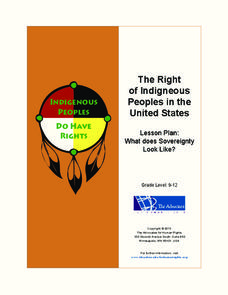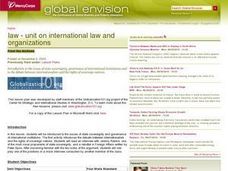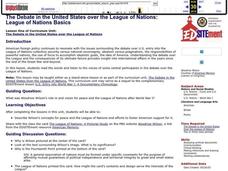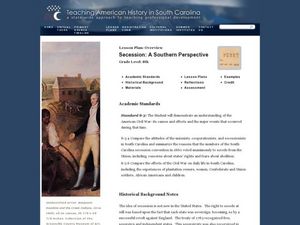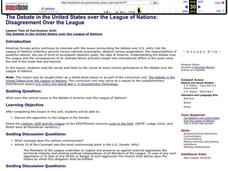Curated OER
The Federalist Debates: Balancing Power Between State and Federal Governments
Students examine the pros and cons of state sovereignty vs. federalism, as argued by the Founding Fathers. They identify the basic positions of each side, complete a worksheet, and write a persuasive essay arguing for Jefferson or Hamilton.
Advocates for Human Rights
The Right of Indigneous Peoples in the United States
The sovereignty of U.S. Native American nations is the focus of a resource that asks class members to compare the Right to Self-Determination in the UN Declaration on the Rights of Indigenous Peoples with a fact sheet that details the...
Curated OER
The Kansas-Nebraska Act of 1854: Popular Sovereignty and the Political Polarization over Slavery
Why did Stephen Douglas support the Kansas-Nebraska Act of 1854? Why did Abraham Lincoln oppose it? Young historians examine how the Kansas-Nebraska Act of 1854 affected the political balance between free and slave states and explore how...
Curated OER
International Law and Organizations
Young scholars conduct research and debate some of the conflicting viewpoints surrounding state sovereignty vs. the governance of international institutions. They read interviews and participate in role-plays.
Curated OER
A House Dividing: The Growing Crisis of Sectionalism in Antebellum America
Students explore the debates over American slavery and the power of the American federal government for the first half of the 19th century and how the regional economies and political events produced a widening split between the states.
Curated OER
The Debate in the United States over the League of Nations
Students investigate Woodrow Wilson's ideas for peace through the League of Nations. They examine how he attempted to encourage American support for the League and the opposition to it that was found in the Senate.
Curated OER
The Debate in the United States over the League of Nations: League of Nations Basics
Learners examine Woodrow Wilson's ideas for peace and the League of Nations. They examine how he garnered supported of it by looking at images and discussing their context.
Curated OER
The Debate in the United States over the League of Nations: League of Nations Basics
Students describe Woodrow Wilson's concepts for peace and the League of Nations and efforts to foster American support for it.
Curated OER
The Federalist Debates: Balancing Power Between State and Federal Governments
Middle schoolers explain the basic positions of the Federalists and the Anti-Federalists. They chart the differences and similarities between state and federal governments. They write a persuasive essay in response to an open-ended...
Curated OER
Secession: A Southern Perspective
Eighth graders determine how secession impacted South Carolina as well as the United States. In this American Civil War lesson, 8th graders examine selected primary and secondary sources in order to study the state's sovereignty and the...
iCivics
Tribal Government: High School
Did you know there are 567 federally recognized American Indian and Native Alaskan tribes and villages in the United States alone? The resource helps break down the complexities of many different tribal societies to explain the concept...
Curated OER
American Indian Tribal Sovereignty
Seventh graders examine the relationship among the governments of the sovereign American Indian Nations in Utah, the State of Utah, and the U.S. They list the objectives of the Office of Indian Affairs and examine their purpose.
Curated OER
Sectionalism and the Kansas-Nebraska Act
Learners define and discuss sectionalism and popular sovereignty, analyze impact of popular sovereignty in creation of state of Kansas, compare issues in territorial Kansas to current politically divisive topic, and evaluate primary...
Curated OER
Popular Sovereignty and the Lecompton Constitution
Learners explore the purpose of the Lecompton Constitution. For this United States History lesson, students read several articles then complete several activities to reinforce their reading, such as a cause and effect worksheet,...
Curated OER
The Kansas-Nebraska Act of 1854: Popular Sovereignty and the Political Polarization over Slavery
Students read selections from the Declaration of Independence, Northwest Ordinance of 1787, and the Wilmot Proviso of 1846. They contrast the maps of 1820 and 1854 to analyze developments in the national debate over slavery. They...
Curated OER
Sectionalism, Popular Sovereignty and Secession
Students read and discuss background material on several key decisions that played a role in the Civil War including the Missouri Compromise, the Kansas-Nebraska Act and the Dredd Scott Decision. They create a timeline and write an essay.
Curated OER
The Debate in the United States over the League of Nations: Disagreement Over the League
Learners examine the opposition of the US Senate to Woodrow Wilson's idea of a League of Nations. They discuss the central ideas involved in the debate over the League.
Curated OER
Québec Sovereignty – Oui ou Non?
Students examine the Quebec question. In this Quebec instructional activity, students research issues related to Quebec's sovereignty. Student then participate in a videotaped debate on the issue.
Curated OER
Social Studies: Native american Tribal Sovereignty
Students examine the issue of tribal sovereignty for Native Americans. Following a mock trial simulation based on the case of Johnson v. McIntosh, they write opinion papers based on the results of the Supreme Court decision in 1823.
Curated OER
Sectionalism, Popular Sovereignty, and Secession
Students examine sequence of national events that resulted in the Civil War by using primary sources, and creating timelines and maps.
Curated OER
George to George
Students use the internet to research the beginnings of the United States government. In groups, they examine the presidency of George Washington while they are guided along a museum tour. They end the lesson by discussing the changes...
Curated OER
Causes of the Civil War: Missouri Compromise, Compromise of 1850 and Kansas Nebraska Act
How did the Missouri Compromise, the Compromise of 1850, and the Kansas-Nebraska Act contribute to the growing tensions that led to the Civil war? To better understand the events that led to the Civil War, young historians engage in a...
Bill of Rights Institute
Celebrate Constitution Day
September 17 is a great day to focus on the US Constitution for on this day in 1787, the Constitution was signed. Through a series of activities, high schoolers get a chance to look closely at this famous document and the rights and...
National Park Service
Same Colors, Different Flavors
Who says getting to know your neighbors has to be difficult? The first resource in a three-part series creates an engaging project that teaches your scholars about Canadian culture. A question-and-answer format takes place via e-mail and...



